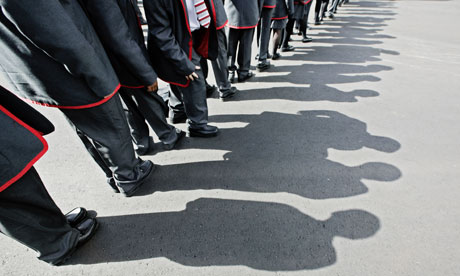
The study shows the UK has tumbled several places since 2006. Photograph: Dan Chung for the Guardian
Around 470,000 15-year-olds across the world sat a numeracy, literacy and science test last year, the results of which inform the latest Pisa study by the Paris-based Organisation for Economic Co-operation and Development (OECD).
The Programme for International Student Assessment (Pisa) is highly respected across the globe, and enables politicians and policy-makers to assess how different countries' education systems compare.
It shows the UK's reputation as one of the world's best for education is at risk, and has tumbled several places since 2006.
The UK is ranked 25th for reading, 28th for maths and 16th for science. In 2006, when 57 countries were included in the study, it was placed 17th, 24th and 14th respectively. Poland has stretched ahead of the UK in maths, while Norway is now ranked higher in reading and maths.
Andreas Shleicher, head of the Pisa programme, said the picture for the UK was "stagnant at best".
"Many other countries have seen quite significant improvement," he added.
The UK performs at about average in reading and maths for countries within the OECD. It is slightly above average in science. In reading, the UK's average score is 494, compared with an OECD average of 493. In maths, our score is 492 and in science 514. The OECD averages are 496 and 501 respectively.
Countries and partnership economies outside the OECD are also included in the study. The highest performing region across all the tests is Shanghai-China, with a mean score of 556 – far higher than any other. The second highest scoring is Korea, with 539, with Finland coming third at 536.
The UK government has made it clear it has been inspired by the Finnish education system in its proposed reforms of schools in England.
The UK spends £54,000 per student, while Germany and Hungary achieve a similar performance for £40,000 and £28,000, the study found. Only seven other OECD countries spend more per student than the UK.
The UK spends an average sum on secondary school teachers, but our teachers work longer hours than the average across the OECD.
The study found that in the UK, the gap between boys and girls was bigger in maths than it was for most other countries. Boys were 20 points ahead of girls.
Within the UK, there is little difference in the performance of 15-year-olds who attend a school in a town or city and their peers who go to a school in the countryside. This is not the case in many countries, such as Hungary, where those living in rural areas are two years behind their urban peers.
Students of Pakistani descent perform better in the UK than they do in many other countries, the researchers found, taking socio-economic factors into account.
The UK has a greater variation in reading standards, which are attributed to class differences, than almost every other country in the OECD. The proportion of students from poor homes who achieve higher than expected scores is lower in the UK than across the OECD on average. Just 24% of UK students perform better than would be expected given their background. The OECD average is 31%. In Finland, Japan and China, 40% of students from poor homes exceed expectations.
In reading, the UK score was similar to Hungary's but below that of Japan, the US, France and Germany – 18% of UK teenagers did not reach the basic reading level, which is in line with the OECD average. In the UK, slightly higher than average proportions of students reach a very high level in science – 1.9%, compared with an OECD average of 1.1%.
The UK has the 14th highest share of students who were not born in the country, and is one of only a few countries where richer pupils have more teachers than poorer ones. Only in Israel, Slovenia, Turkey and the US is this also the case. Parental expectations are higher in the UK than in most OECD countries and our provision of after-school clubs is better.
Michael Gove, the education secretary, said he was daunted "by the scale of the challenge".
"Other countries have been improving rapidly and despite the massive investment over the last 13 years, we haven't been improving at the rate we should have been. We are not getting value for money and we've got to ensure we do better."
He said that other regions and nations had succeeded in "closing the gap".
"They have made opportunity more equal, democratised access to knowledge and placed an uncompromised emphasis on higher standards all at the same time."
Andy Burnham, Labour's shadow education secretary, said that English schools were better today than they were in the 1980s and 1990s. "We should build on this strong foundation to keep driving up standards so they are on a par with the best in the world."

Tidak ada komentar:
Posting Komentar